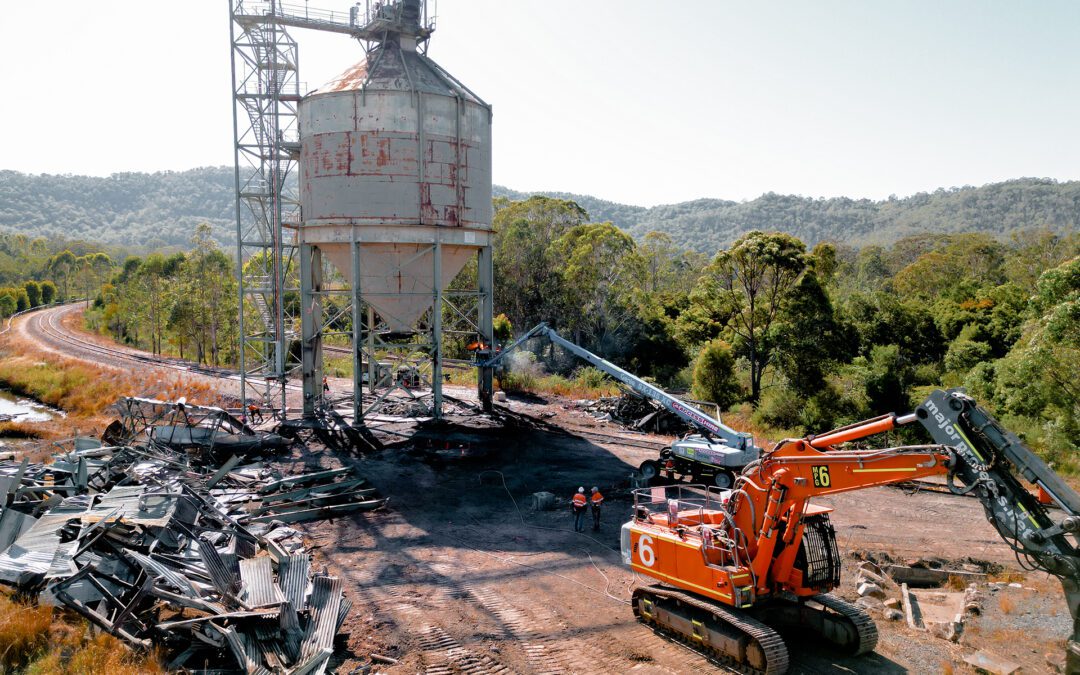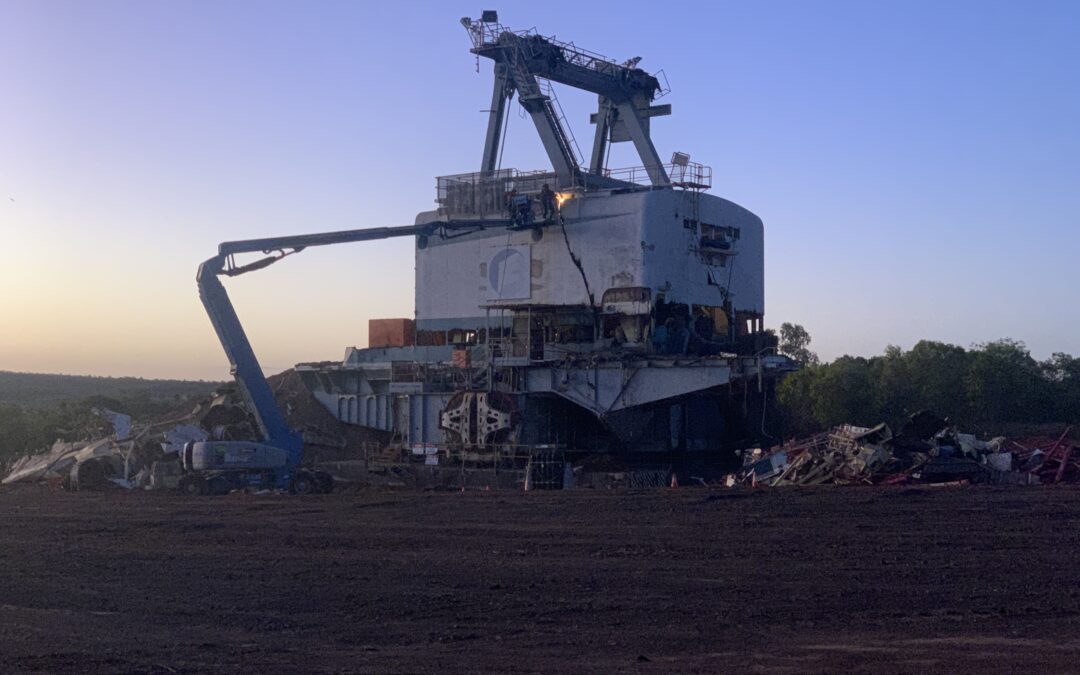Mental health in the demolition industry

When it comes to employee wellbeing, physical safety has long been the prime focus on demolition sites. However, supporting mental health in construction is just as critical.
With construction workers being six times more likely to pass away from suicide as opposed to a physical injury on site, psychological issues are a mounting concern for contractors and their teams across Australia.
When someone is experiencing mental illness, it can not only harm their personal wellbeing, but also their productivity, attention to detail and ability to prevent accidents in the workplace. Therefore, as well as having a moral responsibility, employers are legally required to manage and minimise occupational hazards that may contribute to their employees’ mental ill-health.
At Major Projects Group, we are committed to kickstarting the crucial conversation about mental health in demolition. Having partnered with Transitioning Well, we are taking measures to ensure our people have the support needed to stay safe and healthy on the job.
To encourage other businesses to follow suit, we’ve put together the below guide on how to support mental health during demolition projects, sharing available resources and invaluable advice to help you care for your team members.
Know the numbers behind mental health in construction
In Australia, 190 construction workers die by suicide each year – that’s one life lost every second day. Think this sounds exceptionally high? It is. Studies shows that construction workers are at a greater risk of suicide than professionals in other industries.
As well affecting an individual’s state of mind and resulting behaviour, psychological conditions have been shown to take a serious toll on the company they work for. Research suggests that mental illness and its effects (including reduced output, absenteeism, turnover and workers’ compensation claims) cost NSW businesses approximately $2.4B per year.
These figures stress the importance of prioritising mental health in construction environments like demolition sites – for both employees and their employers. Our sector has made great strides in mitigating the physical safety risks surrounding workers, but now we must look inward. We need to check in with the people behind the plant.
Psychosocial hazards: key causes of mental illness on demolition sites
The Australian organisation Mates In Construction reviewed coroners reports to pinpoint the most common psychosocial hazards contributing to poor mental health in construction workers. Below, we break down these factors in detail.
Lack of communication
At the time of writing, roughly 87% of construction workers in Australia are males, who are at a greater risk of suicide than females. Why? The ‘suck it up and get the job done’ mentality adopted by many men means that demolition workers may find it tough to open up about their deepest emotions with colleagues. Feeling like there is no one to turn to can prevent these individuals from seeking the support they need.
Long hours away from loved ones
Demolition workers often endure long work hours, followed by lonely nights in temporary accommodation miles away from family and friends. This isolated lifestyle can leave workers more vulnerable to relationship breakdown and unhealthy coping mechanisms such as substance abuse and gambling – all of which can contribute to mental illness.
Anxiety-inducing workplace conditions
Mental health and construction can be opposing concepts due to the high-risk environment. Even with personal protective equipment (PPE) and strict safety protocols, accidents can happen on demolition sites. With regular exposure to potentially life-threatening hazards, some workers may find that dangerous workplace conditions are a cause of distress.
Physical stressors and chronic pain
With more and more employees continuing to work in demanding physical conditions past the traditional retirement age, construction workers often end up living with chronic pain. Ultimately, this can encourage harmful coping mechanisms that cause mental health problems like alcohol addiction.
Job insecurity
Workplace conflict and bullying
As with all workplaces, demolition sites can also see conflict and bullying amongst employees. From social exclusion to physical violence, workers may be threatened, abused or assaulted on the job. Whether a once off or repeated each day, such behaviour can have considerable consequences for the target’s mental health.
That is why it is so important to have an anti-bullying policy in your organisation, complete with a clear procedure for reporting and investigating incidents.
High demands and low levels of support
For more information on psychosocial hazards in the workplace, consult SafeWork’s list of factors that impact employees’ mental health.
The mental challenges of staying at or coming back to the demolition site
When a worker is experiencing poor mental health, it can feel particularly daunting and distressing to perform their professional duties. In order to best support an employee during this time, leadership must understand the obstacles that may be hindering their ability to remain at or returning to work.
Common barriers include:
- Fear of stigma, such as that coworkers may react negatively to the diagnosis;
- A perceived or actual lack of personal connection with colleagues and managers;
- Doubt about the extent or nature of mental health support available at work; and
- Worry that workplace contributors to psychological conditions have yet to be resolved.
How to support mental health in the demolition industry
If thrown to the side or handled poorly, psychosocial hazards can begin to build up and strip away at your team’s mental health. As a manager or supervisor, you play a major role in supporting the psychological wellbeing of your team. Here are a few steps you can take to show your staff that they are not alone.
1. Build awareness and tear down stigma
Improving mental health in the demolition industry starts with raising awareness and reducing stigma. Leadership needs to speak up about mental health at work and inspire their teams to do the same.
The Heads Up – Starter Kit is an excellent resource for expressing your dedication to mental health to your staff. Involving team members in this discussion and communicating your support efforts clearly and regularly will help your company to cut through the stigma surrounding mental illness.
Meanwhile, the Toolkit for mental health champions can be employed to build a mental health champions scheme. Mental health champions encourage positive mental health in the workplace by organising a variety of wellness activities throughout the year. They can also point colleagues in the direction of relevant support services as required.
To spread mental health awareness further, hang posters throughout your workplace, share a calendar full of inclusive events and provide a list of support services that your team members can call whenever they need.
2. Implement mental health training
Educate and equip your team with the tools to promote mentally health at work. Through SafeWork NSW, small and medium businesses can receive funding for mental health training. Major Projects Group is taking advantage of this opportunity and partnering with Transitioning Well to create a mentally healthy workplace (more on this below).
Black Dog Institute is another organisation offering free mental health training to eligible businesses throughout NSW. Available online or face-to-face, this short course gives your team the practical resources to discuss and support mental health.
Last but not least, Mates In Construction delivers onsite suicide prevention training to construction workers, teaching them how to spot changes in colleagues’ behaviour and help them to seek help when necessary. Since the programme’s introduction, suicide rates among construction workers in Australia have fallen by 8%.
3. Foster a shared commitment amongst leaders and team members
No one understands what’s required to thrive on the job better than your employees. That’s why it’s vital that you consult your team about how to make the workplace a healthier environment when it comes to their mental wellbeing.
Ask your staff what issues are affecting them and which supports they would like to access. It’s important to make your workers feel like they are able to express their views without judgement and that their opinions on Work Health & Safety matters are valued.
This collaboration can help to achieve this by:
- Actioning employee surveys, workshops, focus groups and private discussions;
- Checking in on mental health initiative progress for ongoing improvement;
- Communicating honestly with your team on a regular basis;
- Establishing mental health champions; and
- Delivering the Toolbox Talk for Construction.
How to help an employee return to work after mental health leave
Returning to work is one of the toughest milestones someone can brave after battling a mental illness. However, it can also be a chance to reinstate a sense of normalcy and purpose.
Although many employers approach such a return with empathy and flexibility, others may have an unrealistic expectation of how long it takes to recover from a mental health incident.
Below, we explain how a business can implement minor modifications that can have a major impact on an employee’s performance, productivity and psychological well being as they recover from mental illness.

1. Take the time to talk (and listen)
The first step is to initiate a confidential conversation with your team member to learn what support services they require and how you can help them to access these resources. You should also ask the employee how they would like you to communicate the situation to their colleagues, if sharing anything at all.
It’s important to make sure that the employee understands that the information disclosed in this discussion is confidential. If any details must be provided to a third party, such as a manager or Human Resources, explain exactly which points will be passed on.
The How to ask R U OK? at work: A practical guide for the workplace and Beyond Blue Return to Work / Stay at Work Discussion Plan are both helpful resources to help you navigate these sensitive discussions effectively.
2. Plan ahead together
Creating a sense of structure around the employees return to work is paramount, minimising any unnecessary stress during this pivotal stage of recovery. This strategy should be developed in collaboration between the employee and their manager.
Begin by setting practical objectives and devising a clear procedure for tracking their progress and refining the approach. The resulting document should avoid any confusion in the future by clarifying roles, responsibilities, and plans to aid the worker’s recovery.
3. Make reasonable changes
- Reduced tasks and responsibilities;
- A flexible working schedule and structure;
- Relocation to a more conducive workspace;
- Organised support from managers and/or coworkers; and
- Additional personal leave.
Making these alterations can bring a range of benefits for your business and employee. For the worker, these changes help to:
- Enhance their day-to-day quality of life;
- Provide a constructive routine;
- Strengthen their sense of direction and purpose; and
- Present opportunities for social connection.
Meanwhile, advantages for the employer span from keeping an employee with valuable skills on your team, sidestepping the expense of onboarding new staff and creating a positive company culture where staff members feel genuinely appreciated.
4. Continue to connect
Whether your staff member requires some time off work or is feeling up to joining the team every day, you must make sure that they still feel appreciated and understood as they continue to recover over the long term.
Speak privately with your employee on a regular basis and see if they would be happy for their coworkers to check in, as well. With so much time spent onsite, strong social bonds at work are key to nurturing mental health during recovery.
The NSW Gov. Recovery at Work Resource Kit features the core principles of ‘Talk’, ‘Plan’, ‘Make Changes’, ‘Stay Connected’. You will also find a Return to Work planning template and recovery-oriented language guide, which are both powerful tools for supporting mental health in construction.
Discover how Major Projects Group is bolstering mental health on the demolition site
As well as working with us to solve occupational issues that may be a source of stress, burnout and fatigue for our employees, the coaches offer assistance with topics such as workplace bullying, client aggression and navigating difficult conversations.
Since gaining this invaluable support, Major Projects Group has:
- Implemented regular Toolbox Talks on our demolition sites;
- Sent out surveys to check in with office personnel;
- Hung up posters to raise awareness of mental health across our offices and sites;
- Included mental health messages on payslips; and
- Instigate one-on-one casual conversations to ask staff if they are genuinely okay.
Let’s care for our construction workers. To learn more about how Major Projects Group is championing mental health in demolition, enquire today on +61(0)2-4967-7900 or [email protected].





